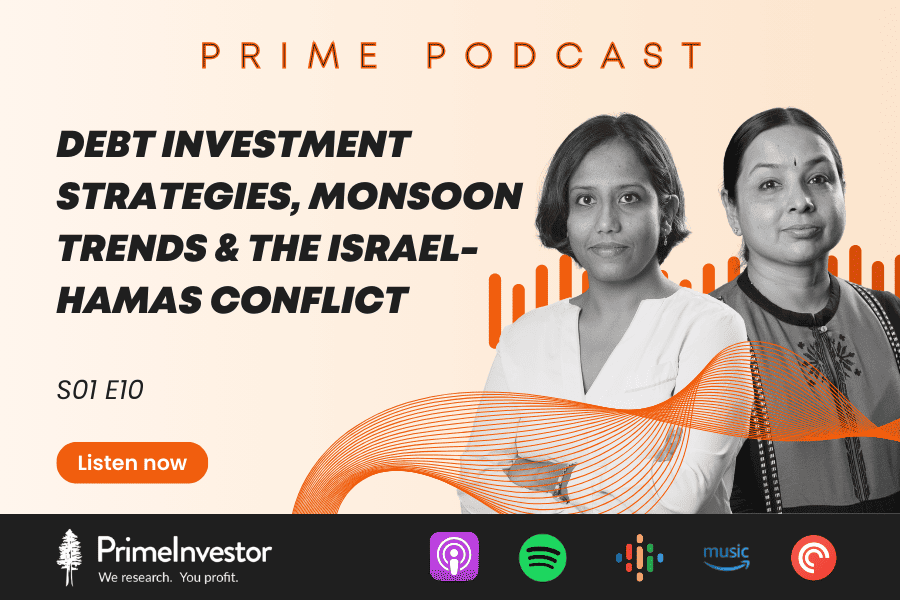Listen to this episode on your favorite podcast app :
What is this episode about?
In this tenth episode of the Prime podcast, hosts Bhavana Acharya and Aarati Krishnan cover a wide range of topics. The podcast is divided into two main segments. In the first segment, they discuss recent news highlights including how the monsoons panned out, the RBI’s monetary policy, and the potential fallout of the Israel-Hamas conflict.
The main segment of the podcast delves into the bond market, debt funds, and investment strategies. They discuss the recent inclusion of Indian government bonds in the GBI EM Global Diversified index by JP Morgan, the surge in US Treasury yields, and the importance of duration in bond investments. They emphasize the significance of time frame when investing in debt funds and suggest a diversified approach to minimize the impact of interest rate fluctuations.
They also provide insights into investing in various types of debt products, including fixed deposits, bonds, and debt funds, while considering individual financial goals and risk tolerance. Additionally, the hosts highlight the potential benefits of investing in constant maturity funds, especially in a rising interest rate environment.

Key segments in the podcast discussion
- TCS Share Buyback: Discussing TCS’s buyback plans (0:41 – 1:08)
- Monsoon Effects: Analyzing the 2023 monsoon season’s impact on India’s agriculture and inflation due to ‘below-normal’ rainfall (1:09 – 3:57)
- RBI’s Monetary Policy: Reviewing the Reserve Bank’s recent monetary policy decisions and its stance on inflation and liquidity (3:58 – 6:07)
- Israel-Hamas Conflict: Examining the potential global consequences of the Israel-Hamas conflict, especially on crude oil supplies and economic factors (6:08 – 8:22)
- Bond Market Updates: Highlighting key developments in the bond market, including the inclusion of Indian government securities in a global bond index and the surge in US Treasury yields (8:29 – 14:15)
- Debt Investment Insights: Offering insights into various debt investment strategies, including accrual and duration-based approaches, and tactical debt opportunities for investors (14:16 – 30:40)
Don’t have a podcast app? Listen to the full episode here :
Follow the podcast wherever you listen to podcasts :




4 thoughts on “Podcast : Bond yields, debt investment strategies & monsoon trends”
Hello Bhavana,
I really like your podcast content and the format. Every forthnight I always look forward to it. It would be nice if you could take a few questions which has been discussed/ unanswered in the PI Community. Otherwise an excellent work by the entire team. Thanks.
Thank you! We’ll certainly pick topics to discuss from the PI Community 🙂 It’s a good source! – thanks, Bhavana
Madam
I am a retiree with an equity heavy portfolio. I have sufficient income at present through pension and wife’s earnings. I postponed investment in debt instruments till now so that the equity portion would help me amass a bigger corpus, and my impression that tax on long term capital gains with indexation benefit, in debt category would be lower than 10 percent levied on LTCG from equity. Due to the recent changes in taxation of non equity funds my calculations have gone kaput. Could you please help me find a good “debt heavy” hybrid fund with benefit of indexation on LTCG. I intend doing SWP from this fund after three years for regular income.
The conservative debt fund category is the only one that will be assuredly debt-heavy, but it does not offer indexation benefits. The other hybrid categories – arbitrage, equity savings, balanced advantage/dynamic asset allocation, aggressive hybrid, multi-asset allocation will all be equity-based using derivatives to reduce equity risk. At best, if you intend to start an SWP after 3 years, you can choose equity savings and balanced advantage funds that are not too aggressive on equity exposure to partly substitute the debt funds. The 3 year period will allow any short-term loss or volatility to reduce. Please check Prime Funds – Hybrid Low Risk for recommendations. – thanks, Bhavana
Comments are closed.